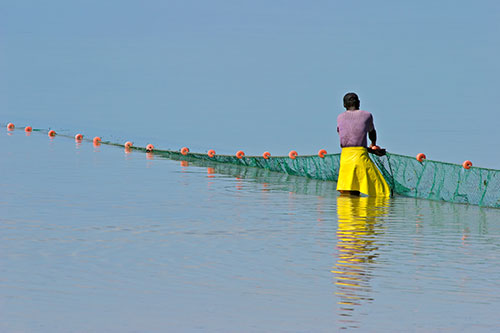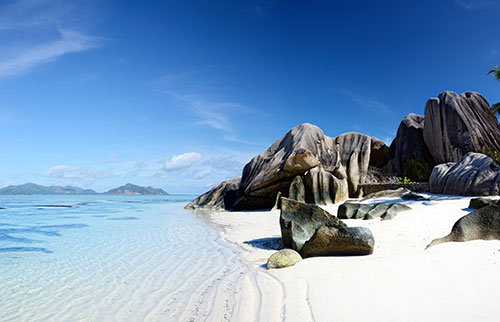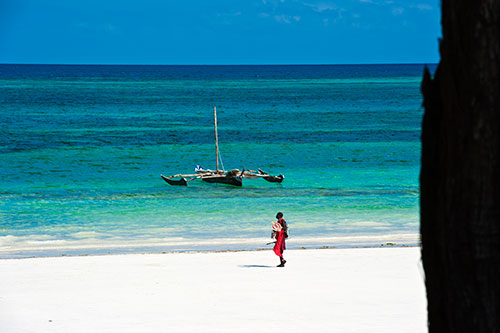A patchwork of beige, yellow, and green spreads across the dry and rugged landscape of the second-largest land mass in the world. Traditionally, Africa has not been linked to the cool blue of the ocean surrounding its vast dynamic shores.
At least, not until 5 June 2017 at The United Nations Ocean Conference in New York where—for the first time in history—oceans have been put at the forefront of global affairs. Africa has expressed a desire to join the Blue Economy movement and begin harnessing its valuable coastlines that could host a maritime industry estimated at $1 trillion per year. And this is only scratching the surface. But with 54 sovereign countries and the second highest population on Earth, can the African people unite to strengthen maritime security and propel the continent into a time of prosperity built upon sustainable ocean industries?
Over the past decade, there has been a steady rise across Africa in the use of the oceans to contribute to economic growth—or what’s known as the Blue Economy. Collectively, the 38 coastal and island African states encompass vast ocean territories of an estimated 13 million square kilometres. As such, the opportunities around Africa’s Blue Economies are enormous, with significant potential to create jobs and improve livelihoods.
However, many key players in Africa—and across the globe—are viewing the ocean for the first time not as a limitless resource, but as a vulnerable asset in need of careful stewardship. Evidence is mounting that ocean resources are limited; for example, 90% of the largest predatory ocean-going fish have disappeared and many coastal and ocean ecosystems show evidence of stress and decline. But not everyone shares this view.
Dr. David Obura, Director of Coastal Oceans Research and Development in the Indian Ocean (CORDIO), explains: “Unfortunately, our perspective on the sustainability of the oceans for the Blue Economy is still a minority. Governments in Africa are dealing with high levels of poverty, the desire to develop rapidly in the next decades, and tremendous population growth—as our ability to harvest marine resources improves, they may want to try to get as much out of the ocean as possible, as quickly as possible. So, for many, sustainability is generally an afterthought.”
“It is an uphill battle for us to get that point across in time before it’s too late. The ocean is nearing the limits of what it can provide without going into decline. There’s nowhere else to go for new biological resources. We must nurture what we have.”
The Ocean: Not A Never-Ending Story
In the pursuit of Africa’s Blue Economies, there will no doubt be issues in trying to protect the marine environment against the oncoming tide of industry. As ocean resources decline around the world, more pressures will only further degrade the marine environment—especially without sound, science-based management and a global collective effort to protect the seas.
In Africa, land-based resources have been plentiful and, for centuries, people lived off the continent, even in the coastal countries. With the rapid growth in population, a rise of competition for resources has pushed economies to search for the next frontier: the sea.
The sudden orientation toward the coastline and open water calls for efforts to ensure the marine landscape is not under threat of pillage, the way fishing and mining efforts have done in the past. “We need to consider what we are calling integrated ocean management for long-term sustainable growth, and we need to do it now. If we are going to survive in the future, we must develop sustainably. And that is the same for all regions—the West, China, the Far East, and the Pacific regions—all of them are now looking towards the ocean as the new frontier for development. Africa is just one part of that equation," explains Obura.
"We need to balance different uses and make sure we are not damaging the environment. This means we must think about wider control and ensure that one economic sector doesn't undermine the resources of another. It needs to be organised in a much more cohesive way nationally, regionally, and globally. Above all else, mind sets need to change and, in Africa as elsewhere, this is the biggest challenge of all.”
Like any widely used term, Blue Economy can be interpreted in different ways. On the Indian Ocean side of the African continent, countries such as South Africa and Mauritius are leading the industrial approach. The Seychelles are also driving several initiatives forward, but with a strong environmental ethic. While all three countries are amongst those leading the Blue Economy movement in East Africa, they have adopted different approaches towards the same concept.
Obura said, "I think it is essential that the African Union is taking an active and firm position on the definition of Blue Economy and pushes a consistent message that is very focused on sustainability. Without this, African states will determine their own approaches to driving the Blue Economy based on their own priorities, and it will be unusual for their focus to be on sustainability. The regional context is also essential to a Blue Economy, as ocean resources don't recognize country boundaries.”
In the Indian Ocean, the Northern Mozambique Channel stands out with the highest species diversity and abundant natural resources. Through a project started by World Wildlife Fund (WWF) and CORDIO East Africa, countries that share this sub-region are beginning a dialogue with non-government organisations (NGOs), private sector partners, and civil society to explore how to cooperate and align under an integrated framework, crossing sectors such as fisheries, tourism, mining, and trade.
“The countries are, of course, starting with different priorities, levels of development, and focus on the sea—but, with some help through the targets and aspirations of the Sustainable Development Goals, we hope to achieve regional alignment and sustainability in Blue Economy approaches over the long term."
 Mozambican fisherman.
Mozambican fisherman.
Preparing the Next Generation for a Blue Future
Another aspect that has become a priority to countries such as South Africa, Kenya, and Seychelles is education. A rise in maritime learning could stimulate a wider ocean consciousness on a continent that is historically land-based in its thinking. Furthermore, young people hoping for maritime opportunities in further education will no longer need to travel abroad to countries such as the UK and Australia, something that would not be financially viable to much of society.
In recognition of this, South Africa's Department of Basic Education has included subjects such as Maritime Economics and Nautical Science at selected high schools as part of its Focus Schools initiatives. But more plans need to be drawn up across Africa's coastal and island countries to address the skills gap and provide training opportunities to help society access the Blue Economy industries.
Professor Dennis Hardy, Vice-Chancellor at the University of Seychelles, said, “The Blue Economy will generate new jobs, and it is important that there is a skilled workforce to fill the vacancies. Higher education is one means, but so too is relevant vocational training. In Seychelles, aquaculture is projected to generate some 3,000 new jobs at all levels. Other aspects of the Blue Economy will also need specialist skills.”
A prime example of collaboration in the region is the FisherMan project, involving universities in Madagascar, Comoros, Zanzibar, and Mozambique as well as Seychelles under the auspices of the University of Alicante, Spain. The project aims to develop specialised degree courses in fisheries management.
At a time when the Blue Economy is now on the world agenda, the extension of traditional subjects to cover ocean and maritime subjects will filter across borders, adding to the whole continent’s knowledge base.
 Seychelles shoreline.
Seychelles shoreline.
Securing the Sea for a Blue Economy
What is often missing in debates are issues of governance and security. Africa has had to contend with three volatile oceanic regions where crime makes it impossible for countries to realise the potential of their oceans. These are the Horn of Africa, the Gulf of Guinea, and the waters of the Mediterranean to the north of Libya. Professor Francois Vreÿ, research coordinator at the Security Institute for Governance and Leadership in Africa, Stellenbosch University, believes that some of the countries on these coasts may have failed to make the areas safe, inadvertently opening the door for criminal players to take advantage.
A recent Greenpeace report found that the West African region loses about $2 billion a year to illegal fishing. While the Blue Economy is there for the taking, it is also vulnerable to irresponsible exploitation that, if not suppressed by authorities, will have wide-spread consequences beyond individual territories.
Vreÿ suggests that African countries could address this by ensuring that their national laws are aligned with the United Nation’s treaty aimed at ocean safety. "The oceans resources are at risk from looting. These looters come in a variety of forms, whether they are Warlords, in cahoots with governments, or irresponsible national operations. Therefore, we need to extend maritime security governance and the rule of law over the ocean—and it starts with individual countries bringing their legislation in step with international legislation. It is one thing to say that we can harness the Blue Economy. It is an entirely different thing to say that we can secure the sea and promote the conditions under which a safe and responsible harvesting of the ocean can take place."
Most African countries are keenly aware of the ocean’s potential as well as the threats to this potential. Several initiatives are now in force to help build a united front against illegal activities at sea.
Vreÿ comments, “You have, for example, the Yaoundé Code of Conduct that helps Western and Central African countries bordering the Gulf of Guinea to extend surveillance and appropriate responses over their allocated maritime zones. The Djibouti Code of Conduct assists African countries along the East African seaboard with capacity building to apprehend, prosecute, and incarcerate sea pirates and, since 2017, to also deal with other maritime crimes. The Lomé Charter of 2016 is a continental effort to encourage and coordinate operational interventions by African countries to attend to maritime security, safety, and development. There is also an EU Project off the west coast of Africa along the Gulf of Guinea that is helping Gulf states to align legislation to ensure that no gaps exist which can be exploited by perpetrators to avoid prosecution as well as build institutions and the capacity to address maritime transgressions."
A project is underway that aims to track how far along coastal states are in the process of alignment the United Nation’s treaty aimed at ocean safety, with a focus on states off the Gulf of Guinea. According to Vreÿ, African leaders will need to push to get every country aligned if they are going to play a role in securing and prosecuting transgressions in their own territorial waters. "We are seeing progress, but we are talking about 38 different countries—some countries take it in stride and others are just not interested or lack the resources to effectively address the threats emanating from the maritime domain. These are the countries that require assistance from an NGO, international maritime organisations, or the United Nations—if they don't have that support, then don’t expect them to bring their legislation into line alone.”
 Diani Beach in Kenya.
Diani Beach in Kenya.
A Prosperous Blue Future for Africa?
Africa’s maritime economic sectors are only at the first stages of development. For example, Kenya’s marine fisheries have consistently recorded national marine catches less than 5% of the total estimated resource. Fisheries and other sectors can likely grow and multiply many times and be a real engine for development for all coastal countries.
But one of the biggest challenges for Africa is that they will be starting several steps behind compared to the rest of the world. "As is the case for many things, African economies do not have a lot of money to invest in the ships and equipment needed. Nor do we have the knowledge base or skilled scientists, engineers, and managers that are experienced in these affairs. Other continents are much further along when it comes to understanding the oceans and how to benefit from them. Africa will get aid from foreign nations, but it may not be done with sustainability and stewardship in mind," explains Obura.
“We need to be planning 20 to 30 years into the future. The UN's Ocean Conference gives us a tremendous opportunity for consistency between international governments and how they can put oceans at the core of the sustainable development agenda. But African countries have many other priorities that they are dealing with right now, so investing in the foundations for a sustainable Blue Economy might not be high on everybody’s agenda.”
Vreÿ adds, "Even if Africa were successful, you will always have governments that will tend to hoard the wealth. I don’t know how we are ever going to get away from that. But you do have leaders that are trying very hard to change an entrenched system, but it takes time. If your economic goods are very limited, then you are more inclined not to share much of what you can harness.”
“The optimistic view is that if you have sufficient economic goods to go around—and the Blue Economy can provide this opportunity—then you could have a broader mind set in how to share it. We need to help leaders be more responsible in making sure that everybody in the whole of society benefits from a Blue Economy future and that development is carried out in a sustainable way that will support Africa and its people in the centuries to come. It is possible, but the road is long and there are many challenges ahead."
Acknowledgements
David Obura, Director of Coastal Oceans Research and Development in the Indian Ocean (CORDIO) East Africa
Francois Vreÿ, Research Coordinator at the Security Institute for Governance and Leadership in Africa, Stellenbosch University
Professor Dennis Hardy, Vice-Chancellor at the University of Seychelles
By: Kira Coley, UK Correspondent





